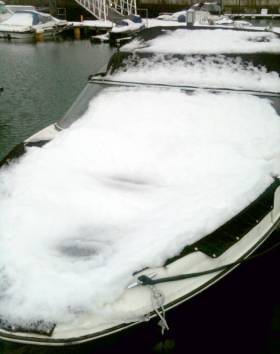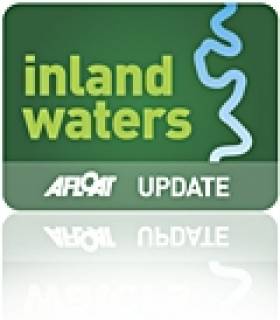Displaying items by tag: winterisation
Prepare Your Boat for Winter Checklist
Putting your boat away for Winter may not be the most exciting topic of this sailing season but a few jobs done right now might save you a lot next summer. Following the devastation recently caused by the first major hurricane of 2016 in the Caribbean, is it only a matter of time before the first winter storms arrive in Ireland? There’s no escaping it, there’s a nip in the air, the Summer boating season is over and boat maintenance raises its ugly head. The whole idea of winterisation can be about as appealing as having a tooth filled – and possibly as expensive – but there’s no substitute for being prepared.
There are also precautions to take against the risk of theft as boats are left unattended for long periods. This was described in a podcast this week by Afloat's Tom MacSweeney. Gardai have also given advice about care of boating property, especially outboard engines, after a spate of thefts around the country including engine thefts in Bray Harbour in County Wicklow last month.
Read Ireland’s five most common boat winterising mistakes and take a look below at the following tips to help boat owners minimise the risk of damage over the winter. The list is based on experience from claims over the past 10 years from Rod Daniels of Craftinsure.
- 1. Securely tie furling headsails to prevent them unfurling in strong winds.
- 2. Remove spray dodgers and boom covers to reduce wind resistance if the boat is to be laid up ashore.
- 3. Don’t rely on automatic bilge pumps as these can become blocked or suffer a power failure.
- 4. Ensure drainage channels are kept clear of leaves and debris so that rain water doesn’t accumulate in cockpits and find it’s way below.
- 5. Make sure dinghies are securely tied down to the ground if left at sailing clubs or any exposed locations
- 6. Winterise engines in accordance with the manufacturer’s recommendations to prevent frost damage.
- 7. Drain any domestic water systems to prevent burst pipes and tanks
- 8. Have electrics checked thoroughly if leaving appliances such as heaters, dehumidifiers or battery chargers connected for long periods.
- 9. Fit hatches with good quality locks, and close cabin curtains and blinds. Remove electronics and other valuable equipment to store safely ashore. Dismount aerials that could indicate attractive items are left on board.
- 10. Arrange for craft left afloat to be checked regularly and for warps to be adjusted as required, especially when rivers and lakes are expected to rise due to heavy rain
- It’s also a good idea to create an Emergency numbers list in your mobile. Include boatyard phone numbers and the Helpline number for your insurer.
Lift Out! End of Season at the National Yacht Club
#liftout – Dublin Bay sailor Cian Guilfoyle shares this Vimeo movie showing an A35 crew preparing GRINGO, a Dublin Bay Sailing Club (DBSC) competitor to come out of the water for the winter a fortnight ago. See you next season!
Shannon Sinkings Result of Poor Winter Preparation
Owners of boats moored on the River Shannon and its tributaries and the inland waterways are counting the costs of the recent icy conditions which have caused the sinking of a high number of vessels.
The Irish Times reports that the Inland Waterways Association of Ireland (IWAI) has advised all boatowners to check their boats after reports of sinkings across six counties.
Among the sunken vessels are a 35ft cruiser opposite the Landmark Hotel in Carrick-on-Shannon. The worst situation is reportedly in Shannon Harbour, with an unusually high number of boats sunk or partially submerged.
Sunken boats often require full refitting to replace damaged finishings and damaged electronics. But of greater concern is the potential environmental impact due to fuel or oil spills, or the leaking of antifreeze and other chemicals.
The IWAI has blamed poor 'winterisation' as a factor in the sharp increase in sinkings.
Winterisation involves the closing of sea cocks to prevent water entering the intake pipes and potentially bursting them when it freezes, or leaking when it thaws.
"Owners need to check on their craft regularly or have a local do it," said IWAI president Paul Garland. "The lessons learned this winter must be taken seriously. Heaters may not be enough; all sea cocks have to be shut."
Click HERE for Afloat.ie's advice on protecting your boat in the thaw.


























































